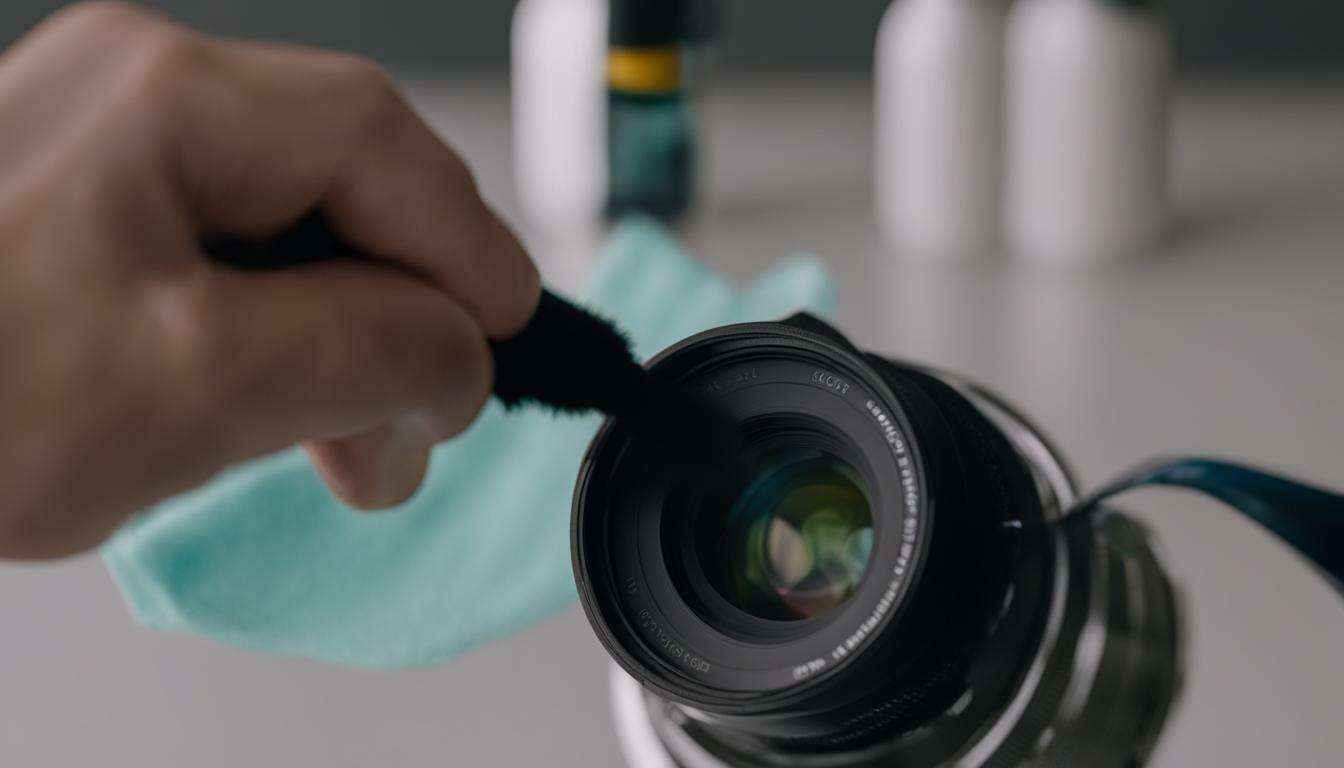Cleaning and maintaining your camera is crucial for preserving its performance and longevity. By following these essential tips, you can ensure that your camera remains in optimal condition and ready to capture every moment flawlessly.
Key Takeaways:
- Keep your camera away from water and moisture to prevent damage
- Replace rechargeable batteries after around 500 cycles
- Clean your lens regularly with a camera cleansing cloth
- Avoid dropping your camera to prevent damage
- Protect your camera from salt water corrosion and rinse with fresh water after exposure
Important steps for camera maintenance
Regular maintenance is key to keeping your camera in top shape and maximizing its capabilities. By following these important steps, you can ensure that your camera remains in optimal condition and ready to capture stunning images.
- Keep your camera away from water and moisture to prevent damage to internal components. Water can cause irreversible damage to the sensitive electronics inside your camera, so it’s important to use protective covers or cases when shooting in wet conditions.
- Replace rechargeable batteries after around 500 cycles. Over time, batteries lose their ability to hold a charge, which can affect the performance of your camera. By replacing them regularly, you can ensure that your camera operates at its best.
- Clean your lens regularly, especially with a digital SLR. Dust and smudges on the lens can impact the quality of your images. Use a camera cleansing cloth and lens cleaning fluid if needed to keep your lens clean and clear.
- Avoid dropping your camera. Accidental drops can cause physical damage to the body and internal components of your camera. Handle your camera with care and use a strap or protective case to minimize the risk of dropping.
- Protect your camera from salt water corrosion. If you’re shooting near the ocean or in other environments with high salt content, it’s important to waterproof your camera and rinse it with fresh water after exposure to prevent corrosion.
- Handle moving parts of the camera with care. If you encounter stuck hinges, buttons, or dials, avoid applying excessive force. Instead, seek professional assistance to avoid causing further damage.
- Always turn off the camera before removing power sources, cables, batteries, or memory cards. This helps prevent damage to the camera’s internal components and ensures safe disconnection.
- Store your camera in a cool, dry place. Excessive heat and humidity can damage your camera and its accessories. Consider using silica gel packets to absorb moisture and prevent condensation, and remove batteries when storing for an extended period of time.
These important steps will help you keep your camera in top condition and extend its lifespan. By following these maintenance practices, you can enjoy optimal performance and ensure that your camera is always ready to capture those special moments.
Table: Camera Maintenance Checklist
| Step | Description |
|---|---|
| 1 | Keep camera away from water and moisture |
| 2 | Replace rechargeable batteries regularly |
| 3 | Clean the lens regularly |
| 4 | Avoid dropping the camera |
| 5 | Protect camera from salt water corrosion |
| 6 | Handle moving parts with care |
| 7 | Always turn off the camera before removing power sources |
| 8 | Store camera in a cool, dry place |
Following these important steps for camera maintenance will help you keep your equipment in optimal condition, ensuring that you can continue to capture amazing photographs for years to come. Remember to handle your camera with care, clean it regularly, and protect it from potential damage. By doing so, you can make the most out of your camera and enjoy the art of photography to its fullest.
Cleaning your camera and lens
Cleaning your camera and lens regularly will ensure that you achieve the best image quality possible. Dust, fingerprints, and other debris can accumulate on your camera’s sensor and lens, resulting in blurry or blemished photos. By following some simple cleaning techniques, you can maintain the clarity and sharpness of your images.
Start by using a blower brush to remove any loose particles from the surface of your camera and lens. Gently brush away the dust and debris, taking care not to scratch the glass or sensor. Next, use a microfiber cloth to wipe down the lens and camera body. This soft cloth will remove smudges and fingerprints without leaving behind lint or scratches.
For stubborn dirt or grime, you may need to use lens cleaning fluid. Apply a small amount to a clean microfiber cloth and gently wipe the lens or camera surface in a circular motion. Be cautious not to saturate the cloth or apply excessive pressure, as this can damage the lens coating or camera components.
| Camera Cleaning Tips |
|---|
| Use a blower brush to remove loose particles. |
| Wipe the lens and camera body with a microfiber cloth. |
| Use lens cleaning fluid for stubborn dirt or grime. |
| Avoid using rough or abrasive materials on your equipment. |
It’s important to note that you should avoid using rough or abrasive materials on your camera or lens, as these can cause permanent damage. Stick with the recommended cleaning tools and techniques mentioned above, and always handle your equipment with care.
“Cleaning your camera and lens regularly will ensure that you achieve the best image quality possible.”
Summary
- Use a blower brush and microfiber cloth to remove dust and smudges from your camera and lens.
- If necessary, use lens cleaning fluid for stubborn dirt or grime.
- Avoid using rough or abrasive materials that can damage your equipment.
By incorporating regular cleaning into your camera maintenance routine, you can keep your equipment in optimal condition and capture stunning, flawless images every time.
Protecting your camera from damage:
Taking precautions to protect your camera from damage is essential for maintaining its functionality. Here are some important steps you can take:
- Keep your camera away from water and moisture to prevent damage to internal components. Water can cause irreversible damage to your camera’s electronics, rendering it inoperable. Always use a waterproof camera cover when shooting in wet conditions and be cautious near bodies of water.
- Avoid dropping your camera to prevent damage to sensitive equipment. Accidental drops can cause internal damage to the lens, sensor, or other vital components of your camera. Use a sturdy camera strap and handle your camera with care to minimize the risk of dropping it.
- Protect your camera from saltwater corrosion by waterproofing it and rinsing it with fresh water after exposure. Saltwater can be particularly damaging to electronic devices, including cameras. Make sure to properly seal your camera and clean it thoroughly after shooting near saltwater.
- Handle moving parts of the camera with care and avoid forcing stuck hinges, buttons, or dials. Applying excessive force or trying to manipulate stuck parts forcefully can cause irreversible damage to your camera. If you encounter any issues, consult the camera’s manual or seek professional assistance.
- Always turn off the camera before removing power sources, cables, batteries, or memory cards. Removing these components while the camera is still powered on can potentially damage the internal circuitry. To avoid any mishaps, always make sure to switch off your camera before making any changes.
Additionally, here are some other tips for protecting your camera:
- Store your camera in a cool, dry place with silica gel packets to prevent condensation and moisture damage. Excessive humidity can lead to the growth of mold and fungus, which can damage your camera’s internal components.
- Avoid prolonged exposure to direct sunlight, as it can damage the sensor and affect the overall image quality. Direct sunlight can cause overheating and potentially harm the sensor or other sensitive parts of your camera. When not in use, store your camera in a shaded area or use a protective camera bag.
- Use lens filters to protect your lens from scratches, dust, and other physical damage. A filter acts as a barrier and absorbs any impact or damage before it reaches your lens. It is easier and more cost-effective to replace a scratched filter than a lens.
Remember, taking proper care and protecting your camera from potential damage can significantly extend its lifespan and ensure that it continues to perform optimally. Incorporating these precautions into your photography routine will help you capture stunning images for years to come.
| Precautions | Benefits |
|---|---|
| Avoid water and moisture exposure | Prevents internal component damage |
| Avoid dropping the camera | Minimizes the risk of internal damage |
| Protect from saltwater corrosion | Preserves camera functionality near coastal areas |
| Handle moving parts with care | Avoids potential damage to hinges, buttons, or dials |
| Turn off the camera before removing power sources | Prevents damage to internal circuitry |
Storing and Caring for Your Camera
Properly storing and caring for your camera is vital to its longevity and overall performance. Here are some essential tips to help you keep your camera in top condition:
- Keep your camera away from water and moisture: Water damage can severely impact the internal components of your camera. Avoid using it in rainy or wet conditions, and if it does get wet, immediately dry it thoroughly with a clean cloth.
- Store your camera in a cool, dry place: High temperatures and humidity can damage the sensitive electronics of your camera. Make sure to store it in a well-ventilated area, away from direct sunlight, and consider using silica gel packets to absorb any excess moisture.
- Protect your camera from impact and scratches: Invest in a sturdy camera bag or case to protect your equipment when not in use or when traveling. Additionally, use lens filters and lens caps to safeguard your lens from scratches and dust.
- Clean your camera and lens regularly: Dust and dirt can accumulate on your camera and lens, affecting image quality. Use a microfiber cloth and a lens blower brush to gently clean the surfaces. If you notice stubborn smudges or fingerprints, use a lens cleaning fluid specifically designed for camera lenses.
- Remove batteries when not in use: To prevent battery drain and potential leakage, remove the batteries from your camera when it’s not in use for an extended period. This will help preserve the battery life and prevent any damage to the camera.
By following these tips, you can ensure that your camera remains in optimal condition and performs at its best, allowing you to capture stunning photographs every time you use it.
| Tips for Storing and Caring for Your Camera |
|---|
| Keep your camera away from water and moisture |
| Store your camera in a cool, dry place |
| Protect your camera from impact and scratches |
| Clean your camera and lens regularly |
| Remove batteries when not in use |
Conclusion
By implementing the proper cleaning and maintenance routines, you can keep your camera in excellent condition and optimize its capabilities. These tips will help you ensure that your camera is always ready to capture every moment flawlessly.
To begin, it is crucial to protect your camera from water and moisture, as they can cause damage to internal components. Additionally, regularly replacing rechargeable batteries and cleaning your lens are essential for maintaining optimal performance and capturing clear, sharp images.
Furthermore, it is important to handle your camera with care, avoiding dropping it and forcing stuck hinges, buttons, or dials. Waterproofing your camera and protecting it from saltwater corrosion are also necessary precautions to take.
Proper storage is key to preserving your camera. Store it in a cool, dry place with silica gel packets to prevent condensation, and remove batteries when not in use. Additionally, protect your lens with filters and store it in a protective bag when traveling to prevent damage from impacts.
Remember to clean your lens and filters regularly using a microfiber cloth and lens blower brush. If you notice dust or smudges in your photos, consider having your camera sensor professionally cleaned. And finally, always handle the camera with a wet weather jacket/cover in wet conditions.
By following these tips and incorporating them into your camera maintenance routine, you can ensure that your camera remains in top condition, allowing you to capture stunning photographs for years to come.
How can Proper Camera Maintenance Help Prolong its Lifespan?
Proper camera maintenance plays a crucial role in prolonging its lifespan. By following manufacturer instructions, cleaning the lenses regularly, and storing it in a safe place, you can ensure that your camera remains in optimal condition. Choosing the right camera for your needs is equally important, as it can eliminate unnecessary strain and ensure you make the most out of your investment.
How Can I Clean and Maintain the Camera as a Camera Man?
Keeping the camera in top-notch condition is crucial for every camera man. To clean it, softly wipe the lens with a microfiber cloth and use a brush to remove dirt particles from the body. Regularly check and clean the sensor, as dust can affect image quality. Maintain the camera’s functionality by updating firmware and protecting it with a sturdy case when not in use.
FAQ
How often should I clean my camera lens?
It is recommended to clean your camera lens regularly, especially if you use a digital SLR. Check for smudges or dirt and clean as needed using a camera cleansing cloth and lens cleaning fluid if necessary.
Can I use water to clean my camera?
No, it is important to keep your camera away from water and moisture to prevent damage to the internal components. Use a camera cleansing cloth and appropriate cleaning solutions for cleaning.
What should I do if my camera gets wet?
If your camera gets exposed to water, it is crucial to dry it thoroughly and avoid turning it on immediately. Remove the battery and memory card and let it dry in a cool, dry place. Consider seeking professional assistance to assess any damage.
How can I protect my camera from scratches and damage?
Using lens filters can help protect your lens from scratches and damage. Additionally, always handle your camera with care, avoid dropping it, and store it in a protective bag when traveling.
How do I store my camera when not in use?
To store your camera, choose a cool, dry place and remove the batteries. Consider using silica gel packets to prevent condensation. Avoid storing it in direct sunlight or high-humidity areas to prevent damage.






